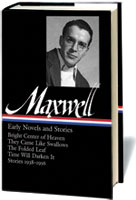From William Maxwell: Early Novels & Stories
Interesting Links
“Art of Fiction” interview with William Maxwell (John Seabrook, The Paris Review)
“Imperishable Maxwell” (John Updike, The New Yorker)
Previous Story of the Week selection by William Maxwell
“The Lily-White Boys”
Buy the book
 William Maxwell: Early Novels & Stories
William Maxwell: Early Novels & Stories
Bright Center of Heaven • They Came Like Swallows • The Folded Leaf • Time Will Darken It • stories • 997 pages
List price: $35.00
Web store price: $31.50
Also available
William Maxwell: Later Novels & Stories
The Château • So Long, See You Tomorrow • stories • 990 pages
List price: $35.00
Web store price: $31.50
“Art of Fiction” interview with William Maxwell (John Seabrook, The Paris Review)
“Imperishable Maxwell” (John Updike, The New Yorker)
Previous Story of the Week selection by William Maxwell
“The Lily-White Boys”
Buy the book
 William Maxwell: Early Novels & Stories
William Maxwell: Early Novels & StoriesBright Center of Heaven • They Came Like Swallows • The Folded Leaf • Time Will Darken It • stories • 997 pages
List price: $35.00
Web store price: $31.50
Also available
William Maxwell: Later Novels & Stories
The Château • So Long, See You Tomorrow • stories • 990 pages
List price: $35.00
Web store price: $31.50
 |
| Take Your Choice, 1885, oil on canvas by American artist John Frederick Peto (1854–1907). Image courtesy of the National Gallery of Art website. |
In February 1936 Maxwell completed his second novel, They Came Like Swallows, told from the point of view of an eight-year-old child living through the devastating 1918 influenza outbreak, and it was acquired by Eugene F. Saxton, the editor-in-chief for Harper & Bros. Through Saxton’s influence, New Yorker fiction editor Katharine S. White purchased two of Maxwell’s short stories.
That summer, while his book was being prepared for press, Maxwell returned to Manhattan, still hoping to find a job. “My publisher gave me three letters,” he recalled, “one to The New Republic, one to Time, and one to The New Yorker. I was unsuited for The New Republic because I was politically uninformed. I don’t know if I was unsuited to Time as well; I got to The New Yorker before I got to Time, and they hired me, and that was that.” During his interview at The New Yorker, White asked what salary he hoped to receive: “Some knowledgeable acquaintance had told me I must ask for $35 a week or I wouldn’t be respected, so I swallowed hard and said, ‘Thirty-five dollars.’ Mrs. White smiled and said, ‘I expect you could live on less.’ I could have lived nicely on fifteen. A few days later I got a telegram from her asking me to report to work . . . at the salary agreed on: $35 a week.”
Maxwell’s early duties included informing cartoonists of acceptances and rejections, but by the end of December (when the two stories purchased earlier appeared in the magazine), White and senior editor Wolcott Gibbs began training Maxwell to edit fiction, memoir, and humor. In March 1937 They Came Like Swallows appeared and was chosen by the Book-of-the-Month Club for its April dual main selection. When Maxwell received his first check for $8,000 from the book club, he “went into Wolcott Gibbs’s office to tell him and could hardly walk, stunned by the overwhelming sum.” During the following year The New Yorker accepted five more of his stories, including “The Actual Thing,” in which the thirty-year-old Maxwell depicts a fifty-seven-year-old bachelor obsessing over the inevitability of death.
By the mid-1940s Maxwell had increasingly and comfortably grown into the role of shepherding and editing authors for the magazine—often to the neglect of his own writing. One author in particular had been sending stories to Maxwell for nearly five years, hoping New Yorker staff members would overcome their reluctance during wartime to publish fiction featuring disaffected youth. Finally, Maxwell moved ahead and scheduled for the December 1946 issue J. D. Salinger’s story “Slight Rebellion off Madison,” featuring the character Holden Caulfield.
Note: Among the books squirreled away in the attic are a volume of works by Robert Green Ingersoll (1833–1899), an American lawyer and orator known for forceful speeches supporting agnosticism; The Clansman, a 1905 historical novel by Thomas Dixon Jr. that romanticized the Old South’s resistance to Reconstruction and the rise of the Ku Klux Klan and that served as the basis of D. W. Griffith’s 1915 film The Birth of a Nation; and Truxton King (1909), the third of six best-selling novels by George Barr McCutcheon about love and intrigue in the royal court of the fictional Central European country of Graustark.
* * *
The odor, if it was an odor, came from the other end of the attic, Mr. Tupper decided. He was looking about for a long wooden croquet box which had certain of his possessions in it—his Knights Templar sword, the works of Ingersoll, and an album of pressed flowers from the Holy Land. . . . If you don't see the full selection below, click here (PDF) or click here (Google Docs) to read it—free!
This selection is used by permission.
To photocopy and distribute this selection for classroom use, please contact the Copyright Clearance Center.
To photocopy and distribute this selection for classroom use, please contact the Copyright Clearance Center.